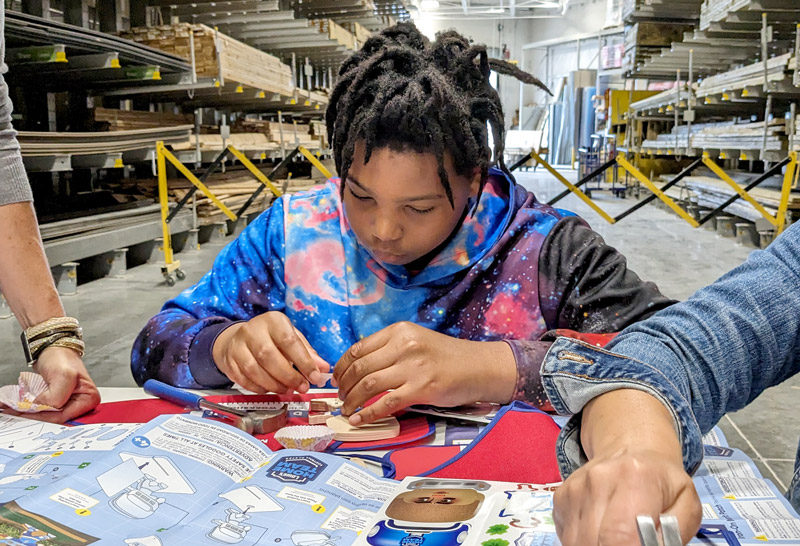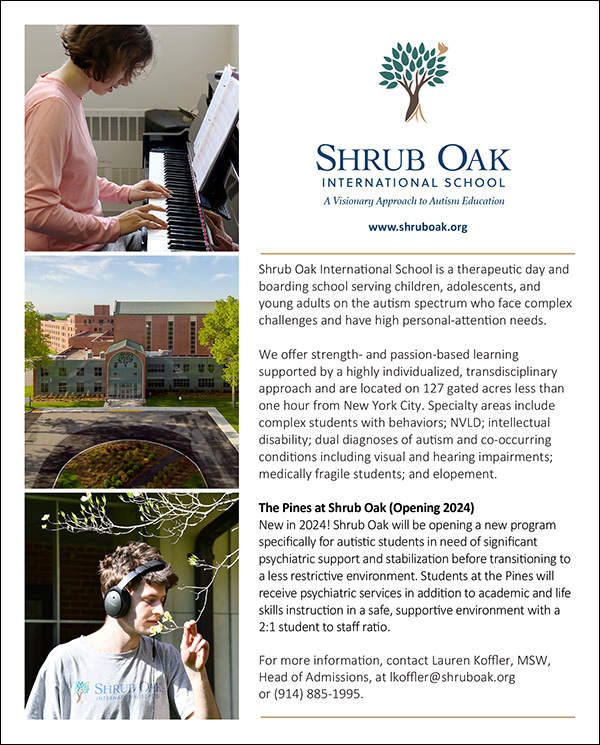Providing school-age support for families and caregivers with an autistic child varies based on the school program the student is enrolled in. It is imperative that alongside the programming and support autistic students receive, parents receive similar services. This includes but is not limited to, autism training, support groups, advocacy assistance, future planning, and resources for a variety of evidence-based interventions, not just those covered by insurance or widely known. When schools view their relationship with parents as a partnership, it enhances the overall programming for the child. Currently, there are no federal or even state standards or benchmarks for providing adequate support to families, therefore, schools must transparently offer this level of care, especially in a residential setting. The decision to send a child to a residential placement does not come without years of advocacy from the family. Many families make this decision after experiencing hardship at home or unsuccessful school environments for their child. Rightfully so, when parents make this decision, they need support from the residential school-based team on a variety of topics that meet each family’s unique needs to truly create a partnership between home and school.

A Shrub Oak International student engaging in the community
Psychoeducation is a critical component for all families with autistic children, especially those who send their children to a residential program. At Shrub Oak International School, we employ a variety of methods that support parents. First, we provide them with monthly virtual parent training so our families from all over the country and world can engage. Our monthly training courses cover a wide range of topics that include clinical domains, community engagement, legal advice, financial planning, and life-skills training. This allows families to gain knowledge to support the transfer of skills and after-care support. Additionally, the training supports effective communication with their child, collaboration with staff, and support for the parents themselves as they are a part of a community. Another avenue for support is our robust Parent Liaison program. Every student and their family are assigned a designated parent liaison who communicates progress with families. This program affords the parents the support of a designated individual who knows their child and everything that is occurring in their day to day at Shrub Oak. We believe that supporting parents as much as possible is as important as the work we do with the students directly.
Furthermore, as mentioned previously, it is imperative that we can provide a holistic and transdisciplinary approach when working with our students as well as the family, in addition to receiving parent feedback on which supports are further needed and what can be implemented in the residential setting. It is evident that parents who have autistic children experience a vast amount of mental health stressors, difficulties in time management, deficits in attending to the daily needs of their child(ren), an onerous feeling in addressing family obligations (Bonis, 2016), and poorer quality of life (QoL) (Vasilopoulou & Nisbet, 2016). As a result, it is imperative that further research be conducted, nationally and internationally, on expanding resources such as having more accessible groups for parents on stress management, psychoeducation, and resources to aide in decision-making when it comes to having an autistic child (Bonis, 2016).
For parents who have an autistic child with co-occurring disorders, the profile of students at Shrub Oak, more support is needed in solid, culturally informed, evidence-based practices such as parent support groups that also aid in increasing parent self-efficacy, as well as, enhancing advocacy skills for reducing the stigma that comes with mental health disorders. Additionally, these groups could recommend policy change for autistic children (Bearss et al. 2015; Liao et al., 2019). Effective parent training and parent-mediated interventions help increase parent psychological well-being, enhance parenting skills to effectively engage their child in times of stress or praise, and strengthens the parent-child relationship to improve family dynamics (Bearss et al., 2015). It is our belief that the stronger the relationship between schools and families are, the more powerful the outcomes for the child are, and as a result, the entire family unit.
Dr. Caitlin Sweetapple is the Director of Research at Shrub Oak International School (SOIS), a private, coeducational, therapeutic day and boarding school for students ages 8-30 on the autism spectrum who face complex challenges. Research at Shrub Oak International School explores, analyzes, and calls attention to a wide range of salient topics pertaining to quality education of autistic students, at Shrub Oak, and globally. For more information, please contact Dr. Sweetapple at csweetapple@shruboak.org.
Mrs. Arij Abdul-Halim is a Licensed Mental Health Counselor and currently pursuing her PhD in Counseling Education and Supervision. She is currently overseeing the Parent Liaison Program at Shrub Oak. She has also served as the Deputy Director for a Functional Family Therapy (FFT) Program at a nonprofit organization affiliated with the Administration for Children’s Services. Arij has worked with all age groups and has provided services for clients on the autism spectrum and with varying diagnoses including ADHD, behavioral issues, depression, anxiety, and educational and learning disabilities. She also enjoys using the Community Resiliency Model and is passionate about improving family dynamics and working with children of all ages. For more information, please contact Arij at aabdul-halim@shruboak.org.
Lauren Koffler, MSW, is Head of Admissions, Communications and Client Relations at Shrub Oak International School, a therapeutic day and boarding school for children, adolescents, and young adults on the autism spectrum who face complex challenges and have high personal attention needs. With more than a decade of experience serving the special needs community, first as an educator and then as an administrator, Lauren is committed to providing students on the autism spectrum with an outstanding education in a warm, supportive, family-centric environment. In addition to her full-time role at Shrub Oak, Lauren is currently pursuing a PhD at Thomas Jefferson University. She may be reached at lkoffler@shruboak.org.
References
Bearss, K., Burrell, T. L., Stewart, L., & Scahill, L. (2015). Parent training in autism spectrum disorder: What’s in a name?. Clinical child and family psychology review, 18, 170-182.
Bonis, S. (2016). Stress and parents of children with autism: A review of literature. Issues in mental health nursing, 37(3), 153-163. https://doi.org/10.3109/01612840.2015.1116030
Liao, X., Lei, X., & Li, Y. (2019). Stigma among parents of children with autism: A literature review. Asian journal of psychiatry, 45, 88-94. https://doi.org/10.1016/j.ajp.2019.09.007.
Nordahl-Hansen, A., Hart, L. & Øien, R.A. The Scientific Study of Parents and Caregivers of Children with ASD: A Flourishing Field but Still Work to be Done. J Autism Dev Disord 48, 976–979 (2018). https://doi.org/10.1007/s10803-018-3526-9
Papadopoulos D. Mothers’ Experiences and Challenges Raising a Child with Autism Spectrum Disorder: A Qualitative Study. Brain Sci. 2021 Mar 2;11(3):309. doi: 10.3390/brainsci11030309.
Steiner AM, Koegel LK, Koegel RL, Ence WA. Issues and theoretical constructs regarding parent education for autism spectrum disorders. J Autism Dev Disord. 2012 Jun;42(6):1218-27. doi: 10.1007/s10803-011-1194-0.
Vasilopoulou, E., & Nisbet, J. (2016). The quality of life of parents of children with autism spectrum disorder: A systematic review. Research in Autism Spectrum Disorders, 23, 36-49. https://doi.org/10.1016/j.rasd.2015.11.008.









[…] reprinted with permission. You may view the original article, published on October 12, 2023, at https://autismspectrumnews.org/the-importance-of-residential-school-based-family-support/. For more information about Autism Spectrum News, please email […]